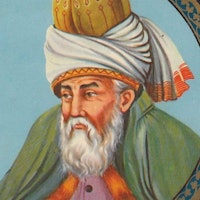This being human is a guest house. Every morning a new arrival… Be grateful for whatever comes because each has been sent as a guide from beyond.
This being human is a guest house. Every morning a new arrival… Be grateful for whatever comes because each has been sent as a guide from beyond.
Jalaluddin Mevlana Rumi

The Guest House
Theme: Healing
This being human is a guest house.
Every morning a new arrival.
A joy, a depression, a meanness, some momentary awareness comes
as an unexpected visitor.
Welcome and entertain them all!
Even if they are a crowd of sorrows, who violently sweep your house empty of its furniture, still, treat each guest honorably.
He may be clearing you out for some new delight.
The dark thought, the shame, the malice.
meet them at the door laughing and invite them in.
Be grateful for whatever comes
because each has been sent
as a guide from beyond.
Jalāl al-Dīn Muḥammad Rūmī (born September 30, 1207, in Balkh, present-day Afghanistan – died December 17, 1273, in Konya, present-day Turkey) is revered as one of the world’s greatest poets, mystics, and spiritual teachers. Known in the West simply as Rumi, he was born into a family of scholars and mystics who fled westward during the Mongol invasions, eventually settling in Konya, then part of the Seljuk Empire. Under the guidance of his father, Bahāʾ al-Dīn Walad, Rumi was trained in Islamic theology, jurisprudence, and the contemplative disciplines of the Sufi path. His early years reflected the classical model of a scholar-saint—rooted in devotion, study, and service to his community.
Rumi’s life was transformed by his meeting with the wandering mystic Shams of Tabriz around 1244. Their profound spiritual companionship awakened in Rumi a passion that transcended formal learning and opened him to the depths of divine love. When Shams mysteriously disappeared, Rumi’s grief became the flame that illuminated his poetry and devotion. From this crucible emerged the Mathnawī, often called the “Persian Qur’an,” a six-volume masterpiece that weaves stories, parables, and reflections into a vision of love as the animating force of all creation. His shorter lyric poems, collected in the Divan-e Shams-e Tabrizi, sing of longing, union, loss, and the ecstatic dance between the soul and the Beloved.
Rumi’s teachings centered on the transforming power of divine love, the unity underlying all faiths, and the inward journey from self-centeredness to God-centeredness. He taught that every experience—joy and sorrow, presence and absence—serves as a mirror reflecting the divine mystery. After his passing, his followers established the Mevlevi Order, known for its sacred whirling as a form of remembrance (dhikr). Across eight centuries, Rumi’s voice has transcended language, culture, and creed, inviting seekers into the stillness of the heart where the human and divine meet in love.
Rumi, Jalaluddin. Rumi: Selected Poems. Translated by Coleman Barks, John Moyne, A. J. Arberry, and Reynold Nicholson, Penguin Books, 2004.

Jalaluddin Mevlana Rumi
Theme: Healing

About This Jelaluddin Mevlana Rumi Quotation [Commentary]
Jelaluddin Mevlana Rumi’s quote, “This being human is a guest house. Every morning a new arrival… Be grateful for whatever comes because each has been sent as a guide from beyond,” reflects a profound understanding of the human condition. Rumi uses the metaphor of a guest house to describe the human experience, suggesting that emotions and experiences are temporary visitors that come and go. This imagery emphasizes the transient nature of our feelings, whether they are joyful or sorrowful, and encourages an attitude of acceptance towards them. By welcoming each “guest” with grace, Rumi implies that these experiences, regardless of their nature, contribute to our personal growth and self-awareness.
In the broader context of Rumi’s passage, he elaborates on this metaphor by advising us to “welcome and entertain them all.” This includes not just the positive emotions but also the “crowd of sorrows” that might leave us feeling empty and disoriented. Rumi’s suggestion to treat each guest honorably, even the painful ones, highlights the idea that suffering and hardship can pave the way for new delights and deeper insights. This perspective aligns with the theme of “Being in Self,” as it calls for a deeper engagement with our inner experiences, fostering a sense of inner resilience and understanding. By meeting dark thoughts and negative emotions with laughter and openness, Rumi encourages us to transform these experiences into opportunities for self-discovery and growth.
Rumi’s concluding advice to “be grateful for whatever comes” encapsulates his holistic view of human existence. He sees every emotion and experience as a “guide from beyond,” suggesting a divine purpose behind our daily trials and triumphs. This gratitude is not merely for the sake of positivity but is rooted in a recognition of the inherent value and lessons each experience brings. In the journey of “Being in Self,” this attitude of gratitude becomes a guiding principle, helping us to navigate the complexities of life with grace and wisdom. Rumi’s timeless words remind us that by embracing the full spectrum of our human experience, we can cultivate a deeper connection with our true selves and the divine.
Additional Jelaluddin Mevlana Rumi Quotations
Resources
Related Quotes
Copyright © 2017 – 2026 LuminaryQuotes.com About Us